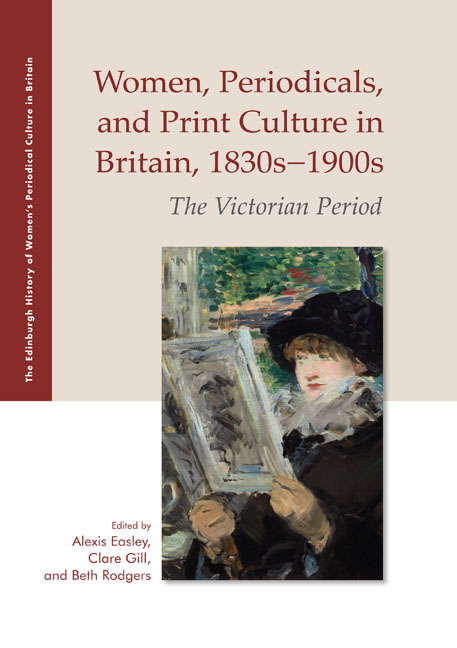Book contents
- Frontmatter
- Contents
- List of Illustrations
- Acknowledgments
- Introduction: Women, Periodicals, and Print Culture in the Victorian Period
- Part I (Re)Imagining Domestic Life
- Part II Constructing Modern Girls and Young Women
- Part III Women and Visual Culture
- Part IV Making Space for Women
- Part V Constructing Women Readers and Writers
- Constructing Women Readers and Writers: Introduction
- 24 ‘Afford[ing] me a Place’: Recovering Women Poets in Blackwood's Edinburgh Magazine, 1827–1835
- 25 Constructing the Mass-Market Woman Reader and Writer: Eliza Cook and the Weekly Dispatch, 1836–1850
- 26 Elizabeth Gaskell and the Habit of Serialisation
- 27 Gender and Genre in Reviews of the Theological Novel
- 28 Reading Poet Amy Levy through Victorian Newspapers
- 29 ‘I simply write it to order’: L. T. Meade, Sisters of Sherlock, and the Strand Magazine
- Part VI Intervening in Political Debates
- Notes on Contributors
- Index
- Plate section
29 - ‘I simply write it to order’: L. T. Meade, Sisters of Sherlock, and the Strand Magazine
from Part V - Constructing Women Readers and Writers
Published online by Cambridge University Press: 25 October 2019
- Frontmatter
- Contents
- List of Illustrations
- Acknowledgments
- Introduction: Women, Periodicals, and Print Culture in the Victorian Period
- Part I (Re)Imagining Domestic Life
- Part II Constructing Modern Girls and Young Women
- Part III Women and Visual Culture
- Part IV Making Space for Women
- Part V Constructing Women Readers and Writers
- Constructing Women Readers and Writers: Introduction
- 24 ‘Afford[ing] me a Place’: Recovering Women Poets in Blackwood's Edinburgh Magazine, 1827–1835
- 25 Constructing the Mass-Market Woman Reader and Writer: Eliza Cook and the Weekly Dispatch, 1836–1850
- 26 Elizabeth Gaskell and the Habit of Serialisation
- 27 Gender and Genre in Reviews of the Theological Novel
- 28 Reading Poet Amy Levy through Victorian Newspapers
- 29 ‘I simply write it to order’: L. T. Meade, Sisters of Sherlock, and the Strand Magazine
- Part VI Intervening in Political Debates
- Notes on Contributors
- Index
- Plate section
Summary
IN 1893, WRITING in her final editorial column for middle-class girls’ literary magazine Atalanta, prolific and bestselling Irish author of children's fiction L. T. [Elizabeth Thomasina] Meade (1844–1914) offered some advice to young female readers determined to emulate her success in the ever-expanding late Victorian literary marketplace: ‘Try and think of yourself as a merchant who has something of value for sale. The editor represents the public, who want to buy. He will quickly appreciate you if he sees that you can give him what his readers want’ (June 1892: 841). This was not the first time that Meade had spoken about the necessity for the modern writer to follow the demands of the changing literary marketplace. In an interview for Young Woman magazine in 1892, Meade unapologetically admitted that she followed the demands of the market: ‘I write my stories a good deal because the publisher wants the book. I simply write it to order, and, of course, if he asks for a girls’ story he gets it, and if he asks for a novel or children's story he gets that’ (June 1892: 122).
In the early 1890s, following the tremendous success of Arthur Conan Doyle's Sherlock Holmes stories for the Strand Magazine, which boosted sales of the alreadysuccessful periodical to over 500,000 copies per issue, what readers and editors wanted was short detective fiction. Thus 1893, the year that Meade resigned as editor of Atalanta, was also the year that the canny ‘merchant’ expanded her professional repertoire, augmenting her children's fiction with a new foray into short-story detective fiction for the Strand. This essay examines Meade's development as one of the Strand's most regularly commissioned and sought-after contributors of crime fiction in the late Victorian period. In her pioneering study The New Girl (1995), one of the first works to argue for Meade's importance, Sally Mitchell astutely noted that in her girls’ fiction, Meade ‘deliberately echoed literature her readers already knew,’ recycling tropes and plot points from popular authors like Louisa May Alcott (15). Subsequent scholars of Meade's girls’ fiction, such as Beth Rodgers (2013; 2014), Janis Dawson (2009; 2013), and Tina O'Toole (2013), have deepened our understanding of Meade's approach to writing as a business, as an exemplary late Victorian professional woman writer.
- Type
- Chapter
- Information
- Women, Periodicals and Print Culture in Britain, 1830s–1900sThe Victorian Period, pp. 470 - 482Publisher: Edinburgh University PressPrint publication year: 2019



